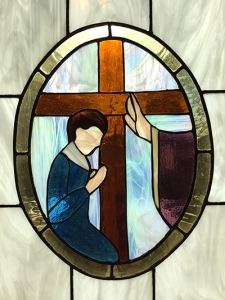 The Sacrament of Reconciliation (Penance / Confession) is an experience of the gift of God’s boundless mercy. Not only does it free us from our sins but it also challenges us to have the same kind of compassion and forgiveness for those who sin against us. We are liberated to be forgivers. We obtain new insight into the words of the Prayer of St. Francis: “It is in pardoning that we are pardoned.” Reconciliation is an experience of the gift of God’s boundless mercy.
The Sacrament of Reconciliation (Penance / Confession) is an experience of the gift of God’s boundless mercy. Not only does it free us from our sins but it also challenges us to have the same kind of compassion and forgiveness for those who sin against us. We are liberated to be forgivers. We obtain new insight into the words of the Prayer of St. Francis: “It is in pardoning that we are pardoned.” Reconciliation is an experience of the gift of God’s boundless mercy.
Jesus entrusted the ministry of reconciliation to the Church. The Sacrament of Reconciliation is God’s gift to us so that any sin committed after Baptism can be forgiven. In confession we have the opportunity to repent and recover the grace of friendship with God. It is a holy moment in which we place ourselves in his presence and honestly acknowledge our sins, especially mortal sins. With absolution, we are reconciled to God and the Church. The Sacrament helps us stay close to the truth that we cannot live without God. “In him we live and move and have our being” (Acts 17:28). While all the Sacraments bring us an experience of the mercy that comes from Christ’s dying and rising, it is the Sacrament of Reconciliation that is the unique Sacrament of mercy.
–From the United States Catholic Catechism for Adults
How to Go to Confession…
United States Conference of Catholic Bishops, Washington, DC. Scripture excerpts taken from the New American Bible, rev. ed. © 2010, 1991, 1986, 1970 Confraternity of Christian Doctrine, Inc., Washington, DC. Excerpts from the English translation of Rite of Penance
©1974, International Committee on English in the Liturgy, Inc.
May the Passion of Our Lord Jesus Christ,
the intercession of the Blessed Virgin Mary and of all the saints,
whatever good you do and suffering you endure,
heal your sins,
help you grow in holiness,
and reward you with eternal life.
Go in peace.
–Rite of Penance, no. 93
1 PREPARATION: Before going to confession, take some time to prepare. Begin with prayer, and reflect on your life since your last confession. How have you—in your thoughts, words, and actions—neglected to live Christ’s commands to “Love the Lord, your God, with all your heart, with all your soul, and with all your mind,” and to “Love your neighbor as yourself” (Mt 22:37, 39)? As a help with this “Examination of conscience,” you might review the Ten Commandments or the Beatitudes.
(Ex 20:2-17; Dt 5:6-21; Mt 5:3-10; or Lk 6:20-26)
2 GREETING: The priest will welcome you; he may say a short blessing or read a Scripture passage.
3 THE SIGN OF THE CROSS: Together, you and the priest will make the Sign of the Cross. You may then begin your confession with these or similar words: “Bless me, Father, for I have sinned. It has been (give days, months, or years) since my last confession.”
4 CONFESSION: Confess all your sins to the priest. If you are unsure what to say, ask the priest for help. When you are finished, conclude with these or similar words: “I am sorry for these and all my sins.”
5 PENANCE: The priest will propose an act of penance. The penance might be prayer, a work of mercy, or an act of charity. He might also counsel you on how to better live a Christian life.
6 ACT OF CONTRITION: After the priest has conferred your penance, pray an Act of Contrition, expressing sorrow for your sins and resolving to sin no more.
A suggested Act of Contrition is:
My God,
I am sorry for my sins with all my heart.
In choosing to do wrong
and failing to do good,
I have sinned against you
whom I should love above all things.
I firmly intend, with your help,
to do penance,
to sin no more,
and to avoid whatever leads me to sin.
Our Savior Jesus Christ
suffered and died for us.
In his name, my God, have mercy.
(Rite of Penance, no. 45)
7 ABSOLUTION: The priest will extend his hands over your head and pronounce the words of absolution.
You respond, “Amen.”
8 PRAISE: The priest will usually praise the mercy of God and will invite you to do the same. For example, the priest may say, “Give thanks to the Lord for he is good.” And your response would be, “His mercy endures for ever” (Rite of Penance, no. 47).
9 DISMISSAL: The priest will conclude the sacrament, often saying, “Go in peace.”
The Sacrament of Reconciliation is offered here at Good Shepherd Church on Saturday mornings from 9:30 a.m. – 10:30 a.m., and 6:00pm – 7:00pm as well as by appointment (call 770.887.9861).
Click the link for information about children wishing to make their First Reconciliation.
